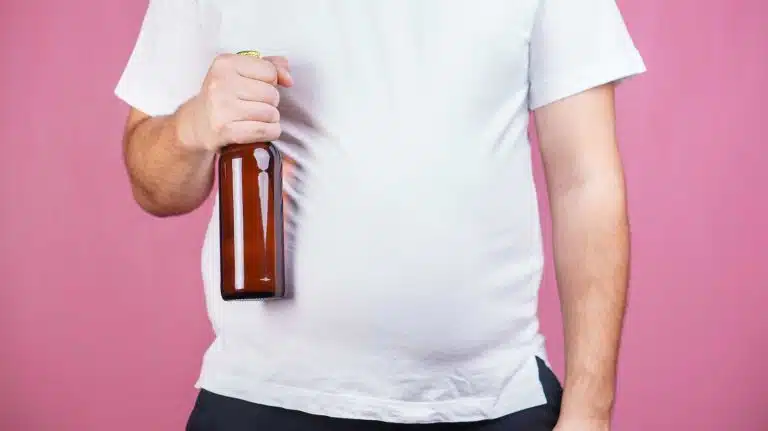What Causes Beer Belly & How To Get Rid Of It
- The Truth About Beer & Your Belly
- Beer Belly Cause
- Beer Bellies & Health Risks
- How To Lose Belly Fat

You’re probably familiar with the infamous beer belly, known scientifically as abdominal obesity.
Among Americans and many other urbanized populations, this physical condition has become extremely common. It is also quite worrying in terms of a person’s long-term health outlook.
But are beer guts actually caused by beer consumption? And, what can be done if you’ve developed a spare tire of your own?
The Truth About Beer & Your Belly
Myth: Drink a lot of beer, get a beer belly.
Truth: It depends on the situation.
Excessive consumption of beer can certainly cause your belly to grow, but beer isn’t the only cause of abdominal obesity.
There are plenty of people who develop excess belly fat despite never drinking beer or alcohol at all. It depends on the individual and how their body reacts to his or her diet and lifestyle.
Beer & Abdominal Obesity
Many studies have indeed found that alcohol (and beer in particular) is associated with a tendency towards abdominal obesity, especially chronic heavy alcohol consumption in men.
But different studies have reached different conclusions and proposed different mechanisms to explain this association. Ultimately, the following is what we do know for certain.
Beer Belly Cause
Abdominal obesity shares the root cause of any other form of obesity: excess calorie consumption.
If the body takes in more energy than it needs, whether those calories are presented in food or drink, it will store a portion of that energy for future use, packing it into adipose deposits (fat cells), which then swell and divide over time.
While it is possible to shrink these adipose cells by maintaining a calorie deficit (using more calories than you bring in) it is very difficult to eliminate new fat cells once they’ve formed. This makes it harder and harder to lose body weight and keep it off the longer you carry it.
Beer Belly Risk Factors
There are several other factors which are thought to increase a person’s likelihood for developing abdominal obesity. These include high consumption of:
- sugar, especially fructose (found in soft drinks, fruit juices, and many other sources)
- trans fats (found in many industrial cooking oils)
- meat
- highly-processed foods
- high-calorie alcoholic drinks (beer and mixed drinks)
Other factors include:
- high levels of daily stress
- maternal smoking (potentially contributing to future abdominal obesity in the developing fetus)
- estrogenic compounds (compounds that mimic the structure of the hormone estrogen, including byproducts of common plastics)
- endocrine-disrupting chemicals
Beer Bellies & Health Risks
Abdominal obesity can impact a person’s self-image, self-confidence, and the likelihood that they will go out and work to maintain a healthy lifestyle.
But visceral fat, or fat stored deep under the skin around the organs, is also known to have many less-visible health impacts, even when compared with subcutaneous fats and other body fat.
This includes increasing a person’s risk of developing:
- metabolic syndrome
- type 2 diabetes
- high blood pressure
- cardiovascular disease
- asthma
- Alzheimer’s disease
How To Lose Belly Fat
Unfortunately, sit-ups alone won’t give you a six-pack if you struggle with abdominal obesity. Neither will giving up ice cream, switching to light beer, or signing up for the next miracle cure advertised online.
Instead, the only way to manage abdominal obesity and any other form of unwanted weight gain is to make focused and long-term lifestyle changes.
This includes increasing physical activity and consuming fewer calories to force the body to use the energy already stored in your abdominal fat.
Weight Loss Strategies
Additional strategies that may help you lose weight include:
- mixing aerobic and resistance exercise, which has been found to provide more benefit than aerobic exercise alone
- eating a low or no-carb diet, as this may prompt the body to enter a state of ketosis, converting fat to ketones for fuel
- intermittent fasting, waiting an extended period (often 16 or 20 hours) between meal periods so that the body uses stored fat, without heavily limiting your meal selections when you do eat
- eliminate liquid calories by drinking water exclusively, as many drinks ranging from fancy coffees to soft-drinks, fruit juices, and alcoholic beverages are exceedingly high in sugar
If you recognize the many health benefits that giving up alcohol could provide, but have been unable to follow-through when you’ve tried in the past, please contact us today to learn about our treatment options.
Written by Ark Behavioral Health Editorial Team
©2024 Ark National Holdings, LLC. | All Rights Reserved.
This page does not provide medical advice.
Centers for Disease Control & Prevention: Preventing Chronic Disease - Factors Affecting Obesity and Waist Circumference Among US Adults
Circulation - Expanding Evidence for the Multiple Dangers of Epidemic Abdominal Obesity
Current Obesity Reports - Alcohol Consumption and Obesity: An Update
Mayo Clinic - Belly fat in men: Why weight loss matters
Questions About Treatment?
Ark Behavioral Health offers 100% confidential substance abuse assessment and treatment placement tailored to your individual needs. Achieve long-term recovery.
100% confidential. We respect your privacy.
Prefer Texting?
Our friendly support team is here to chat 24/7. Opt out any time.







 Learn More
Learn More








